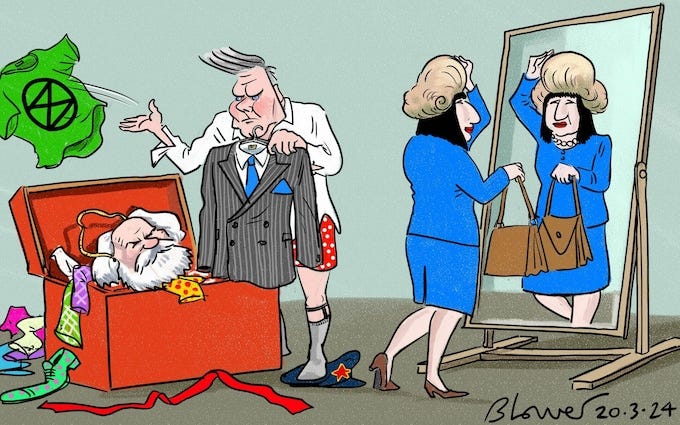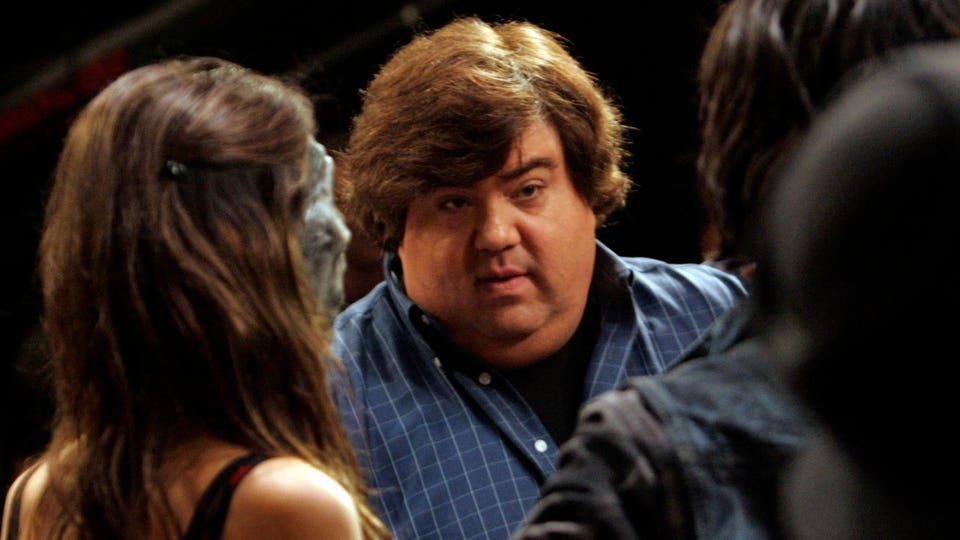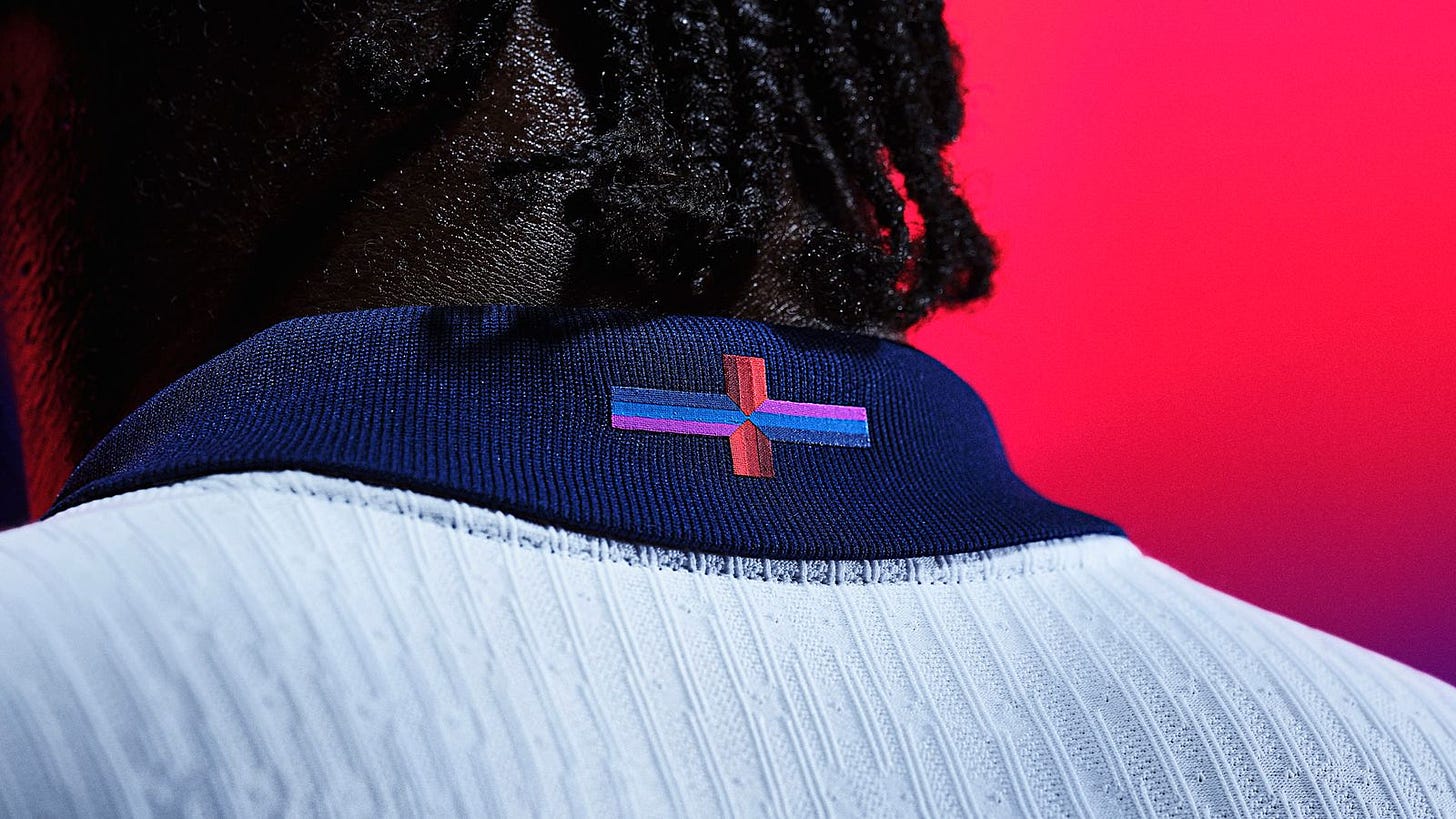Borkowski Weekly Media Trends: Labour x Thatcher, Quiet on Set Doc & England Shirt
Labour channels Thatcher’s spirit
We may not know when the government will call the election, but with every passing day, we're getting closer to what's looking like a thumping Conservative defeat. Labour will be approaching these polls with caution as, more often than not, they don't provide the complete picture, especially months out. But their comms operation is ramping up, and this week, they've started to channel the late Margret Thatcher - an unlikely idol for a party looking to oust a Tory government whose leaders have routinely done the same thing. From Boris and Sunak repeatedly admiring her tenacity whilst in power to when Liz Truss's outfit at the first Tory leadership debate matched the look worn by Thatcher in 1979.
We saw it a couple notable times this week, first in an interview with Politico, shadow foreign secretary David Lammy described Thatcher as a "visionary leader for the UK" then his colleague Rachel Reeves gave the annual Mais lecture to London financiers, praising the radical former PM and Tory icon (Reeves didn’t mention Thatcher by name, but did say “at the end of the 1970s", which is a clear enough reference). And beyond this Starmer has previously praised Margaret Thatcher for bringing ‘meaningful change’ to the UK.
It’s risky, especially antagonising Labour's left, with the likes of Owen Jones publicly criticising Starmer's leadership and withdrawing from the party. Regardless of the general election result, this tactic will result in huge and potentially damaging internal rifts within the party- an almost certain future headache.
But as things stand, with no manifesto or clear policy direction, Labour clearly feels they can take a calculated risk in summoning the ghost of Thatcher to draw comparisons to previous era-defining election swings. The 1979 Conservative reference both rattles the current government and, in theory, sets up Starmer as an equally strong leader when isolating results alone (assuming the polls offer a glimpse of what's to come).
Is this a case of overthinking the comms strategy? Possibly. It runs the risk of exacerbating Starmer's lack of identity, both personally and politically. After years as Labour's leader, it still needs to be determined what policies Starmer stands for. But outside of the UK politics bubble, the approach is clearly working. By merely standing as a competent human while the Tory party slowly crumbles, Starmer is slowly winning over the public or doing enough to direct anger toward the current government. The question is whether this is enough to win a majority government.
Nickelodeon abuse scandal exposed
The release of “Quiet on Set: The Dark Side of Kids TV” this week cast light on the sordid underbelly of 00’s children’s television, sharing stories of abuse and toxicity at Nickelodeon that shatter its squeaky-clean facade. It cemented the fall from grace of producer Dan Schneider, architect of shows like “iCarly” and “Drake & Josh”, who previously faced claims of workplace bullying and inappropriate behaviour with his child stars.
The documentary’s fallout, trending on social media this week, brings into focus many disturbing revelations, including Drake Bell’s sexual abuse committed by Brian Peck, a former Nickelodeon dialogue coach. The sheer gravity of these claims tied with public concern has put intense pressure on Bell’s co-star, Josh Peck (no relation), who is facing backlash for his perceived silence despite reportedly extending private support to Bell.
In most social media storms, the crowd often craves someone to blame, and its relentless gaze demands some kind of authentic gesture, which in this case risks eclipsing genuine acts of support that occur behind closed doors. There is always a danger that authenticity is sacrificed at the altar of public approval.
The attention will turn to those celebrities who wrote letters in support of Brian Peck’s being granted probation during his 2004 sentencing for abuse of a minor (now revealed to be Drake Bell). The millions invested in this story will apply pressure to those who supported Peck and will undoubtedly seek legal and PR counsel to manage this potential crisis.
There is a danger that the public will clamour for justice, which means any form of apology will likely ring hollow. Public or private, social media is out for blood and we’ve seen the lack of compassion for private gestures.
There is a need for a seismic shift in the industry’s culture, and the industry’s biggest players must lead the charge of dismantling the structures that enabled such abuses to thrive. But the mob needs to accept that if we continue to call for public self-flagellation and absolve those we deem to do it sufficiently, then that’s what we’re going to get: public admissions of wrongdoing without the substance to make meaningful change.
Cross to bear: Nike’s new kit flops
As Emily Thornberry made the morning TV rounds today, she was asked by GB News about a tweet, including a photo of a house adorned by England flags, that led to her resignation from Ed Miliband’s shadow cabinet ten years ago. Thornberry had been dispatched to deliver the Labour party line on the new England kit (“Why has it got all these other colours in it?”), which is merely the latest interview to offer an instructive example of how much the culture war has changed, or perhaps not changed, the Labour party.
The new kit, designed by Nike, was released yesterday, with a subtle change to the flag on the back of the collar – rather than the traditional St George’s Cross, a blue, navy and purple trim is overlaid, meant as a nod to the training colours of the 1966 World Cup team. Predictably, consternation ensued: the Prime Minister said Nike “shouldn’t mess” with the flag, while Peter Shilton, England’s most capped player, said that as representatives of their country the flag should be portrayed properly. But much of the dismay seemed to rest on the misapprehension that the design change was in some way woke or virtue signalling, a “rainbow flag”, when the only virtue it pointed to was the legacy of Geoff Hurst and the rest of the ’66 team. For what it’s worth, the FA have since doubled down in defence of the change.
Arguably both Nike and the FA should have known that this was inevitable. In times of polarisation, any country’s flag assumes even greater iconographic importance, not least as something to fight over, and both parties have responded as such. But for Labour, once the party of Thornberry’s ill-judged tweet, it once again highlights the dramatic shift Starmer has overseen: for the party’s leader to appear on a podcast, hosted by The Sun, to defend the honour of the English flag only serves to highlight that we are, once again, in uncharted territory. Starmer is, of course, a devout football fan, yet his stance is more about the people he seeks to court than it is about his own convictions – any comms on the change, be it from Labour, the Tories, or Nigel Farage, simply reflects the fact that every political operator thinks that this is what people want to hear. Accusations of virtue signalling, no matter how ill-founded, are now essentially paradigmatic in political communications, something that will only increase in the build-up to the election.
On Nicky Campbell’s show this morning, he did manage to find callers conjuring the usual memories and motifs, crying God for Harry, England, and St. George. With the FA planning to use the shirts for the Euros campaign in the summer, it is certainly possible that the outrage cycle will continue to run, buoyed by politicians using it for fleeting capital. Longer football campaigns, and their potential success, bring goodwill, however, something that doesn’t tend to accompany mid-season friendlies on a Saturday night. If the team is successful in June, everything will be forgotten. At the moment, it just looks like a particularly expensive reminder that England is actually playing football this weekend.








